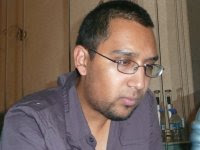On 8 September, ASIA HOUSE hosted an event which provided a little preview of what can be expected. In the framework of its Understanding Islam Series, a panel of three UK-based Muslim intellectuals moderated by journalist Hadani Ditmars, Co-Editor of the New Internationalist and author of Dancing in the No-fly Zone: A Woman's Journey Through Iraq
 Political scientist Nafeez Ahmed, executive director of the Institute for Policy Research and Development (IPRD) (Its website appears currently to be down) and author of a number of books on both the 9/11 and 7/7 bombings and their aftermath, used the occasion to expound his views on the combined efforts of Western intelligence services and corporate interests connected with the oil and gas industry to manipulate politics in Iraq, Afghanistan and Central Asia using the 'War on Terror' as a cover. While addressing very important issues and rightly highlighting the more sinister aspects of big business influencing international policy-making, his narrative was in way somewhat dated: reminiscent of the ideology-laden leftist rhetoric of the 1960s and 1970s against the military-industrial complex, updated with the by now equally stale conjectures of conspiracy theorists (as becomes also evident from the titles of some of his books which appear to rehash the same points: The War on Freedom: How and Why America was Attacked, September 11, 2001
Political scientist Nafeez Ahmed, executive director of the Institute for Policy Research and Development (IPRD) (Its website appears currently to be down) and author of a number of books on both the 9/11 and 7/7 bombings and their aftermath, used the occasion to expound his views on the combined efforts of Western intelligence services and corporate interests connected with the oil and gas industry to manipulate politics in Iraq, Afghanistan and Central Asia using the 'War on Terror' as a cover. While addressing very important issues and rightly highlighting the more sinister aspects of big business influencing international policy-making, his narrative was in way somewhat dated: reminiscent of the ideology-laden leftist rhetoric of the 1960s and 1970s against the military-industrial complex, updated with the by now equally stale conjectures of conspiracy theorists (as becomes also evident from the titles of some of his books which appear to rehash the same points: The War on Freedom: How and Why America was Attacked, September 11, 2001A much more refreshing take on the ethos of Islam and the future of culture in the Muslim world and - perhaps just as important -- among the Muslim communities in Europe and North America, was given by the Indian-born poet and film-maker Mahmood Jamal. He made a case for a bold and courageous questioning of the Islamic tenets, rightly arguing that 'doubt' is almost a sine qua non to keep a culture fresh and retain its vitality. He concluded with a declamation from his collection of poems Sugar-Coated Pill
 You want to speak of War
You want to speak of WarI want to speak of Peace.
You say Punish
I say Forgive
You speak of God’s Wrath
I speak of His Mercy
Your Quran is a Weapon
My Quran is a Gift
You speak of the Muslim brotherhood
I speak of the brotherhood of Man
You like to Warn others
I like to Welcome them
You like to speak of Hell
I like to speak of Heaven.
You talk of Lamentation
I talk of Celebration.
You worship the Law
I worship the Divine.
 You want Silence
You want SilenceI want Music
You want Death
I want Life
You speak of Power
I speak of Love.
You search out Evil
I warm to the Good
You dream of the Sword
I sing of the Rose petal
You say the world is a Desert
I say the world is a Garden
You prefer the Plain
I prefer the Adorned
You want to Destroy
I want to Build
You want to go Back
I want to move Forward
You are busy Denying
I am busy Affirming
Yet there might be one thing
on which we see eye to eye
You want Justice
So do I.
Polymath and prolific author Ziauddin Sardar was conspicuously brief in his comments, only noting that in addition to compassion, which Nafeez Ahmed had very correctly highlighted as a much more important theme in Islamic teachings than the antagonism towards other religions, it is the complex notion of Tawhid or 'Oneness' which holds center stage in Quran. This should not only be understood as referring to the radical monotheism of Islam, stressing the unity and unicity of God or the transcendent, but also to the integrity of creation.
 This brought Sardar also to a different reading of khilafa. Instead of interpreting it as an injunction to the establishment of a caliphate or formation of an Islamic state -- used as the affirmation of the inseparability of religion and politics, Sardar suggest returning to the etymology of the word: the vicegerency over creation entrusted to man by God. Such an understanding, turning man into a trustee, would also be helpful in enhancing the awareness of the ecological questions facing mankind -- issues that are not featuring prominently in the thought of most Muslim ideologues. (See also his blogging the Quran).
This brought Sardar also to a different reading of khilafa. Instead of interpreting it as an injunction to the establishment of a caliphate or formation of an Islamic state -- used as the affirmation of the inseparability of religion and politics, Sardar suggest returning to the etymology of the word: the vicegerency over creation entrusted to man by God. Such an understanding, turning man into a trustee, would also be helpful in enhancing the awareness of the ecological questions facing mankind -- issues that are not featuring prominently in the thought of most Muslim ideologues. (See also his blogging the Quran).








No comments:
Post a Comment